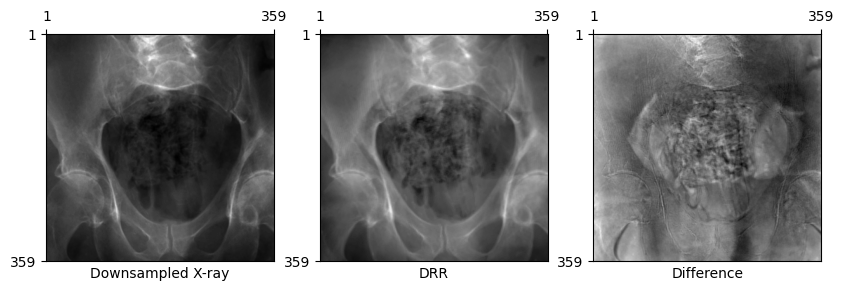Open-source 2D/3D registration datasets and dataloaders for
DiffDRR
pip install diffdrrdataDiffDRR is an differentiable
X-ray renderer used for solving inverse problems in tomographic imaging.
If you find DiffDRR useful in your work, please cite our paper:
@inproceedings{gopalakrishnan2022fast,
title={Fast auto-differentiable digitally reconstructed radiographs for solving inverse problems in intraoperative imaging},
author={Gopalakrishnan, Vivek and Golland, Polina},
booktitle={Workshop on Clinical Image-Based Procedures},
pages={1--11},
year={2022},
organization={Springer}
}
We provide APIs to load the following open-source datasets into
DiffDRR:
| Dataset | Anatomy | # of Subjects | # of 2D Images | CTs | X-rays | GT Fiducials |
|---|---|---|---|---|---|---|
DeepFluoro |
pelvis | 6 | 366 | ✅ | ✅ | ❌ |
Ljubljana |
neurovasculature | 10 | 20 | ✅ | ✅ | ✅ |
If you use any of these datasets, please cite the original papers.
DeepFluoro
(Grupp et al.,
2020)
provides paired X-ray fluoroscopy images and CT volume of the pelvis.
The data were collected from six cadaveric subjects at John Hopkins
University. Ground truth camera poses were estimated with an offline
registration process. A visualization of the X-ray / CT pairs in the
DeepFluoro dataset is available
here.
@article{grupp2020automatic,
title={Automatic annotation of hip anatomy in fluoroscopy for robust and efficient 2D/3D registration},
author={Grupp, Robert B and Unberath, Mathias and Gao, Cong and Hegeman, Rachel A and Murphy, Ryan J and Alexander, Clayton P and Otake, Yoshito and McArthur, Benjamin A and Armand, Mehran and Taylor, Russell H},
journal={International journal of computer assisted radiology and surgery},
volume={15},
pages={759--769},
year={2020},
publisher={Springer}
}
import matplotlib.pyplot as plt
import torch
from diffdrr.drr import DRR
from diffdrr.visualization import plot_drr
from diffdrrdata.deepfluoro import DeepFluoroDataset, Transforms
# Load a subject from the DeepFluoroDataset
deepfluoro = DeepFluoroDataset(id_number=1, bone_attenuation_multiplier=2.5)
# Initialize the DRR module
subsample = 4
drr = DRR(
deepfluoro.subject,
deepfluoro.focal_len,
deepfluoro.height // subsample,
deepfluoro.delx * subsample,
x0=deepfluoro.x0,
y0=deepfluoro.y0,
reverse_x_axis=False,
)
transform = Transforms(deepfluoro.height // subsample)
# Render a DRR from the ground truth camera pose
gt, pose = deepfluoro[0]
img = drr(pose)
gt, img = transform(gt), transform(img)
plot_drr(torch.concat([gt, img]), title=["Downsampled X-ray", "DRR"])
plt.show()Ljubljana
(Mitrovic et al.,
2013) provides
paired 2D/3D digital subtraction angiography (DSA) images. The data were
collected from 10 patients undergoing endovascular image-guided
interventions at the University of Ljubljana. Ground truth camera poses
were estimated by registering surface fiducial markers.
@article{pernus20133d,
title={3D-2D registration of cerebral angiograms: A method and evaluation on clinical images},
author={Mitrović, Uros˘ and S˘piclin, Z˘iga and Likar, Bos˘tjan and Pernus˘, Franjo},
journal={IEEE transactions on medical imaging},
volume={32},
number={8},
pages={1550--1563},
year={2013},
publisher={IEEE}
}
from diffdrrdata.ljubljana import LjubljanaDataset, Transforms
# Load a subject from the LjubljanaDataset
ljubljana = LjubljanaDataset(id_number=1)
gt, pose, focal_len, height, width, delx, dely, x0, y0 = ljubljana[0]
# Initialize the DRR module
subsample = 8
drr = DRR(
ljubljana.subject,
focal_len,
height // subsample,
delx * subsample,
width // subsample,
dely * subsample,
x0=-x0,
y0=y0,
reverse_x_axis=False,
)
transform = Transforms(height // subsample, width // subsample)
# Render a DRR from the ground truth camera pose
img = drr(pose)
gt, img = transform(gt), transform(img)
plot_drr(torch.concat([gt, img]), title=["Downsampled X-ray", "DRR"])
plt.show()



